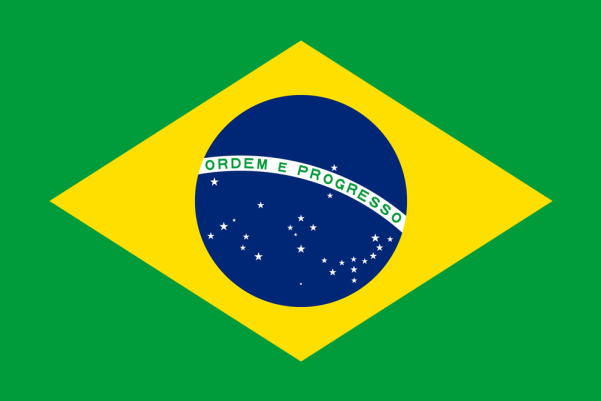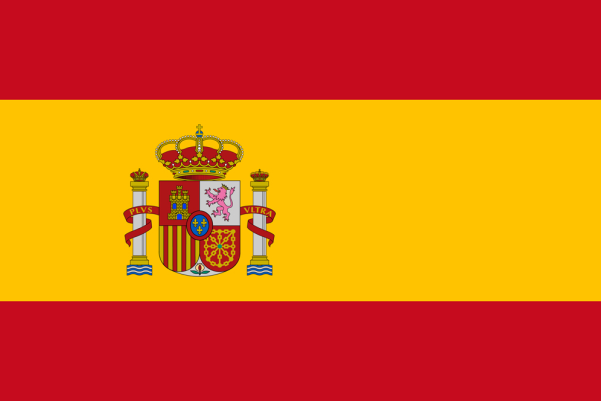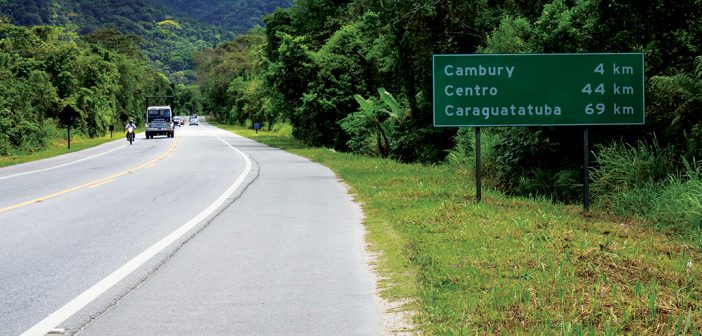The Rio-Santos road, with all its twists and turns along the coastline, its enchanting beaches and its rich sense of history is one of the most stunning roads in Brazil;
The winding road leaving Santos unlocks the natural beauty that few other routes can boast and be even the inspiration for the famous song, As Curvas da Estrada de Santos, penned by Roberto Carlos, the famous Brazilian musician.
The Rio-Santos is a federal highway that runs between the Serra do Mar and one of the most beautiful stretches of the Brazilian coastline. It is 457 kilometres long and connects Rio de Janeiro’s capital to Santos’s metropolitan region. Alternating stretches of mountainous curves with panoramic ocean views, the road offers access to dozens of small coastal towns. Also, it features several privileged viewpoints to let drivers take a break and enjoy the vista.
At first glance, Angra dos Reis – a two-hour drive from Rio – has little to boast of besides its harbour. However, she shows her true beauty at sea and reveals her magnificent hidden surprises. They are no less than 365 islands off the coast that account for more than two thousand beaches of all varieties, from private properties to truly tropical hideaways accessible only by boat – you can rent both private or shared boats. To reach Ilha Grande, the largest of the islands, you can catch a ninety-minute ferry to the island’s main port, Abraão Village. The village itself prohibits the use of cars on ecological grounds. Still, it offers a range of accommodation options, all located close to nearby trails leading to more than 100 beaches and waterfalls. It is a dream destination for those seeking adventure, relaxation, and nature.
The coast of São Paulo offers a similar but slightly more urbanised alternative: Ilhabela, a charming island with a twenty-minute crossing (a ferry that also transports cars) from the coastal town of São Sebastião. Known as the “Capital of Sailing” – given that it plays annual host to a week of international nautical events – the island offers a good spread of restaurants and accommodations, ranging from the more rustic to the more sophisticated and several idyllic beaches. This is home to the Ilhabela In Jazz festival that takes place every year, usually in October, an international event for those who appreciate the elegant harmonies of jazz surrounded by the sounds of the sea.
Another well-known destination on the same stretch of coast is Caraguatatuba. With seventeen beaches, the city plays host to several gastronomic festivals, such as the Festival do Camarão (Shrimp) in June, the Festival da Tainha (Mullet) in July, and the Festival do Mexilhão (Mussel) in November. Much like the coastal towns of Maresias and Ubatuba, it is one of the more popular summer resorts amongst Paulistas (residents of São Paulo)
In addition to the beautiful scenery, the Rio-Santos also offers access to some important historical references from days of colonisation in Brazil: the charming Paraty, one of the oldest cities on the south coast of Rio de Janeiro, has managed to preserve its historical centre with the aesthetic richness of the era, with its colonial architecture and quaint cobbled streets. Annual events, such as the Feira Literária Internacional (International Literary Fair), mean people flock to the town in July and August. As well as the entire historical context, waterfalls and boat trips to pristine beaches are a perfect getaway for those searching for tranquillity. Further north along the São Paulo coast is the city of Bertioga, home to the oldest and best-preserved fortress in Brazil: the Forte de São João, dating back to 1547.
And needless to say, the highway begins and ends with two of the oldest and most important cities in Brazil: Rio de Janeiro, South America’s most popular tourist destination with its famous beaches and cultural attractions, and the city of Santos, the largest city on the coast of São Paulo and home to the busiest port in Brazil.
Given the vast array of things to see and do along the Rio Santos, the old saying could not be more fitting: it’s the journey that counts, not the destination.
For more information about Brazil, travelling to Brazil, Holidays in Brazil and Brazilian tourism please also visit VBRATA Visit Brazil Travel Association.
The Brazilian Destinations online training courses for travel agents are offered and managed exclusively by VBRATA Visit Brazil Travel Association. Brazil Online Training by VBRATA offers travel industry specialists the opportunity to learn more about Brazilian destinations and travel products by offering a selection of Brazilian online courses so that travel agents can increase their knowledge and become a specialist in Brazil.
















